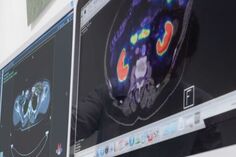Forschungsgruppe Dermatologische Tumore
Folgende Hauttumore sind gut oder sehr gut strahlenempfindlich: Basalzellkarzinom (Basaliom), Plattenepithelkarzinom (Spinaliom), Morbus Bowen, Kutane Lymphome (CL) – Mycosis fungoides, Malignes Melanom – Lentigo maligna und Merkelzellkarzinom (MCC). Die Strahlentherapie ist je nach Stadium eine Therapieoption bei der Behandlung von bösartigen Hauttumoren. Diese kommt insbesondere in Situationen, in denen der Hauttumor nicht vollständig entfernt werden konnte (R1 oder R2 Resektion) zum Einsatz. Eine weitere Indikation ist die Inoperabilität. Weiter kann bei einem Tumorrezidiv nach einer Operation die Prognose durch eine strahlentherapeutische Behandlung verbessert werden.
The following skin tumors are sensitive to radiation therapy: basal cell carcinoma (basalioma), squamous cell cercinoma (spinalioma), bowen`s disease, cutaneous lymphoma (CL), mycosis fungoides, malignant melanoma, merkel cell carcinoma (MCC). Depending on stage radiotherapy is a treatment option for affected patients. Often this is used in particular situations in which the skin tumor cannot be completely removed (R1/R2 resection) or in case of inoperability. Furthermore, in case of tumor recurrence the prognosis can be improved by using radiation treatment.
Ärztliche Mitarbeiter-/innen
PD Dr. med. Kristin Uzun-Lang
Geschäftsführende Oberärztin, Arbeitsgruppenleiterin Gastrointestinale und Dermatologische-Tumore, Partikeltherapie, Intraoperative Strahlentherapie (IORT), Ganzkörperbestrahlung (TBI), Palliativmedizin

Dr. med. Tilmann Rackwitz
Oberarzt, Forschungsschwerpunkt: Dermatologische-Tumore, benigne Bestrahlung

Dr. med. Lukas Bauer
Kooperationspartner-/innen
NCT (Tumoren der Haut):
- Prof. Dr. J. Hassel (Hauttumorzentrum)
- DKFZ
- Prof. Dr. Dr. A. Abdollahi (Klinische Kooperationseinheit Translationale Radioonkologie)
Forschungsschwerpunkte / Aktuelle Projekte
- Merkelzellkarzinome
- Schleimhautmelanome unter bimodaler Radiotherapie (OS, PFS und Kontrollrate sowie biologische Prognosefaktoren)
Klinische Studien
Influence of timing of Radiotherapy on Immune respoNse in patients with metastasized melanomA A mulitcenter trial conducted by DKTK-PARADIGM consoritum (rekrutiert aktuell)
Literatur / Publikationen
- Dinges, L.-A.; Eichkorn, T.; Regnery, S.; Hörner-Rieber, J.; Debus, J.; Hassel, J.C.; Lang, K. Postoperative Radiotherapy and the Role of Regional Lymph Node Irradiation in Localized Merkel Cell Carcinoma: A Single-Center Retrospective Analysis. Cancers 2022, 14, 6140. https://doi.org/10.3390/cancers14246140
- Bauer L, Paul A, Regnery S, Deng MY, Ellerbrock M, Mielke T, Harrabi SB, Seidensaal K, Held T, Herfarth K, Debus J, Hassel JC, Uzun-Lang K. Bimodal intensity-modulated radiotherapy in combination with carbon ion therapy (C12) of mucosal melanomas - data of the last decade from Heidelberg University Hospital. Front Oncol. 2024 Nov 22;14:1437412. doi: 10.3389/fonc.2024.1437412. PMID: 39650062; PMCID: PMC11621079
- AWMF S2k-Leitlinie Merkelzellkarzinom (MZK, MCC, neuroendokrines Karzinom der Haut), AWMF-Register Nr. 032/0023, Stand 20.12.2018, gültig bis 30.12.2022
- Strom T, Naghavi AO, Messina JL, et al. Improved local and regional control with radiotherapy for Merkel cell carcinoma of the head and neck. Head Neck 2016;39:48-55.
- Strom T, Carr M, Zager JS, et al. Radiation Therapy is Associated with Improved Outcomes in Merkel Cell Carcinoma. Ann Surg Oncol. 2016;23(11):3572-3578.







